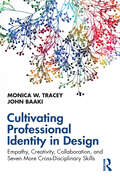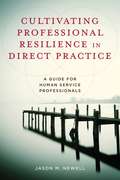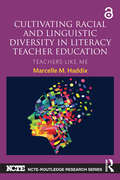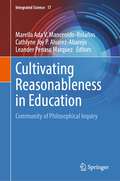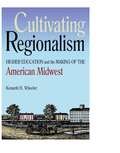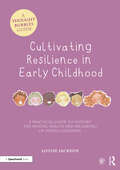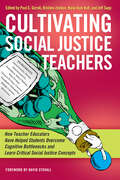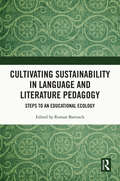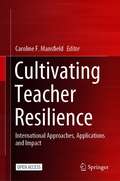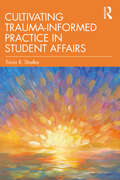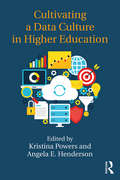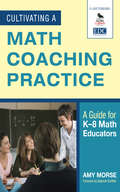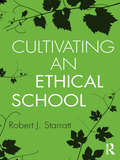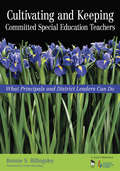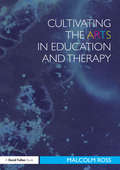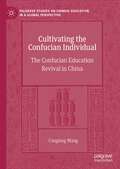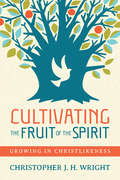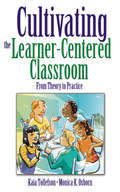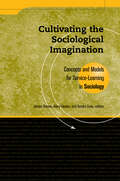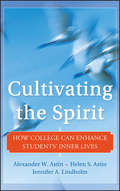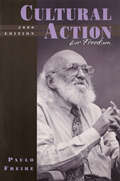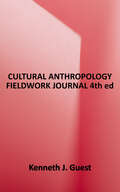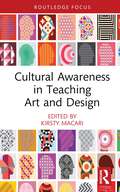- Table View
- List View
Cultivating Professional Identity in Design: Empathy, Creativity, Collaboration, and Seven More Cross-Disciplinary Skills
by Monica W. Tracey John BaakiCultivating Professional Identity in Design is a nuanced, comprehensive companion for designers across disciplines honing their identities, self-perception, personal strengths, and essential attributes. Designers’ identities, whether rooted in education, workforce training, digital technology, arts and graphics, built environment, or other fields, are always evolving, influenced by any combination of current mindset, concrete responsibilities, team dynamics, and more. Applicable to designers of all contexts, this inspiring yet rigorous book guides practitioners and students to progress with ten key traits: empathy, uncertainty, creativity, ethics, diversity/equity/inclusion, reflection, learning, communication, collaboration, and decision-making.Though it details a complete journey from start to finish, this book acknowledges the varying paths of designers’ roles and is structured for a flexible, highly iterative reading experience. Segments can be read individually or out of order and revisited for new insights. Current and future stages of development – education experience, early-career opportunities, mid-career accomplishments, and/or career transitions – are factored in without hierarchy. Specific takeaways, activities, and reflection exercises are intended to work across settings and levels of experience. Design hopefuls and experts alike will find a new way to participate in and persevere through their work.
Cultivating Professional Resilience in Direct Practice: A Guide for Human Service Professionals
by Jason M. NewellOverwhelming empirical evidence indicates that new social workers, particularly those going into child welfare or other trauma-related care, will discover emotional challenges including the indirect or secondary effects of the trauma work itself, professional burnout, and compassion fatigue. However, the newly revised CSWE Educational Policy and Accreditation Standards (EPAS) does not mandate the inclusion of content related to self-care in social work curriculum or field education. In a textbook that bridges the gap between theoretical and pragmatic approaches to this important issue in human service work, Jason M. Newell provides a potential resolution by conceptualizing self-care as an ongoing and holistic set of practice behaviors described as the key to professional resilience.To address the effects of trauma-related care on direct practitioners, Newell provides a comprehensive, competency-based model for professional resilience, examining four key constructs—stress, empathy, resilience, and self-care—from a range of theoretical dimensions. For those who work with vulnerable populations, the tendency to frame self-care solely within organizational context overlooks the importance of self-care in domains beyond the agency setting. Alternatively, he uses a framework grounded in the ecological-systems perspective conceptualizing self-care as a broader set of practice behaviors pertaining to the whole person, including the physical, interpersonal, organizational, familial, and spiritual domains of the psychosocial self. Alongside professional self-care practices at the organizational level, Newell makes a case for the pragmatic role of recreational activities, time with family and friends, physical health, spirituality, and mindfulness. The application of a comprehensive approach to self-care practice has potential to empower practitioners to remain resilient and committed to the values, mission, and spirit of the social work profession in the face of trauma.
Cultivating Racial and Linguistic Diversity in Literacy Teacher Education: Teachers Like Me (NCTE-Routledge Research Series)
by Marcelle M. HaddixCultivating Racial and Linguistic Diversity in Literacy Teacher Education examines how English and literacy teacher education—a space dominated by White, English-monolingual, middle class perspectives—shapes the experiences of preservice teachers of color and their construction of a teacher identity. Significant and timely, this book focuses attention on the unique needs and perspectives of racially and linguistically diverse preservice teachers in the field of literacy and English education and offers ways to improve teacher training to better meet the needs of preservice teachers from all racial, ethnic, and linguistic backgrounds. These changes have the potential to diversify the teacher force and cultivate teachers who bring rich racial, cultural, and linguistic histories to the field of teaching.
Cultivating Racial and Linguistic Diversity in Literacy Teacher Education: Teachers Like Me (NCTE-Routledge Research Series)
by Marcelle M. HaddixCultivating Racial and Linguistic Diversity in Literacy Teacher Education examines how English and literacy teacher education—a space dominated by White, English-monolingual, middle class perspectives—shapes the experiences of preservice teachers of color and their construction of a teacher identity.Significant and timely, this book focuses attention on the unique needs and perspectives of racially and linguistically diverse preservice teachers in the field of literacy and English education and offers ways to improve teacher training to better meet the needs of preservice teachers from all racial, ethnic, and linguistic backgrounds. These changes have the potential to diversify the teacher force and cultivate teachers who bring rich racial, cultural, and linguistic histories to the field of teaching.Chapters 1, 2, and 3 of this book are freely available as downloadable Open Access PDFs at http://www.taylorfrancis.com under a Creative Commons Attribution-Non Commercial-No Derivatives (CC-BY-NC-ND) 4.0 license.
Cultivating Reasonableness in Education: Community of Philosophical Inquiry (Integrated Science #17)
by Marella Ada V. Mancenido-Bolaños Cathlyne Joy P. Alvarez-Abarejo Leander Penaso MarquezThis book focuses on the real-world application of the Philosophy for/with Children (P4wC) pedagogy to cultivate reasonableness in individuals through communities of philosophical inquiry. It presents a collection not only of theories but, more importantly, of experiences, discoveries, and innovations on P4wC by scholars, trainers, advocates, and practitioners around the world. Each chapter provides readers with insights and lessons that have resulted from the continuous application, exploration, and enrichment of the concepts, principles, and practices that were developed by Matthew Lipman and Ann Margaret Sharp into what P4wC is today - a dialogic pedagogical approach that may just be what is needed at a time when reasonableness and dialogue are essential to maintaining global stability and progress. In this light, this book also looks into how the P4wC approach can be practiced with adults such as when it is employed in various settings or contexts such as in business consulting, textbook writing, peace education, and extremism prevention, among others. Furthermore, this book also features chapters that discuss how the P4wC pedagogy can be beneficial once integrated into processes such as classroom teaching, teacher education, bioethics, and employee education. This book provides valuable insights about how reasonableness that is cultivated through building communities of philosophical inquiry in education can be a powerful tool for nation-building and social transformation.
Cultivating Regionalism: Higher Education and the Making of the American Midwest
by Kenneth WheelerIn this ambitious book, Kenneth Wheeler revises our understanding of the nineteenth-century American Midwest by reconsidering an institution that was pivotal in its making—the small college. During the antebellum decades, Americans built a remarkable number of colleges in the Midwest that would help cultivate their regional identity. Through higher education, the values of people living north and west of the Ohio River formed the basis of a new Midwestern culture. Cultivating Regionalism shows how college founders built robust institutions of higher learning in this socially and ethnically diverse milieu. Contrary to conventional wisdom, these colleges were much different than their counterparts in the East and South—not derivative of them as many historians suggest. Manual labor programs, for instance, nurtured a Midwestern zeal for connecting mind and body. And the coeducation of men and women at these schools exploded gender norms throughout the region. Students emerging from these colleges would ultimately shape the ethos of the Progressive era and in large numbers take up scientific investigation as an expression of their egalitarian, production-oriented training. More than a history of these antebellum schools, this elegantly conceived work exposes the interplay in regionalism between thought and action—who antebellum Midwesterners imagined they were and how they built their colleges in distinct ways.
Cultivating Resilience in Early Childhood: A Practical Guide to Support the Mental Health and Wellbeing of Young Children (Thought Bubbles)
by Louise JacksonWritten to support the use of the Thought Bubbles picture books, this guidebook has been created to help teachers and practitioners initiate ‘nurturing conversations’ and cultivate resilience in young children. Early identification of mental health and wellbeing needs by those who spend the most time with the children is key to offering the support vulnerable children need. This series takes a proactive approach to mental health support, creating a culture of trust and resilience long before crisis point is reached. Based on the author’s extensive research and wealth of experience, this guidebook will help start the conversation, showing the reader what to do and say early on in a child’s life, to help influence the way that they experience the world in the future. This book: Offers practical, low-cost actions that can be easily adapted to suit different environments and contexts. Explores key topics such as effective listening, communication, relationships and environments. Is designed to facilitate the effective use of the four Thought Bubbles picture books, supporting the practitioner to elicit nurturing conversations. Designed to be used in a range of childcare settings, this book is an essential resource for all those who care for and educate young children.
Cultivating Social Justice Teachers: How Teacher Educators Have Helped Students Overcome Cognitive Bottlenecks and Learn Critical Social Justice Concepts
by Paul C. Gorski Kristien Zenkov Jeff Sapp Nana Osei-KofiFrustrated by the challenge of opening teacher education students to a genuine understanding of the social justice concepts vital for creating an equitable learning environment?Do your students ever resist accepting that lesbian, gay, bisexual, transgender, or queer people experience bias or oppression, or that their experiences even belong in a conversation about “diversity,” “multiculturalism,” or “social justice?”Recognizing these are common experiences for teacher educators, the contributors to this book present their struggles and achievements in developing approaches that have successfully guided students to complex understandings of such threshold concepts as White privilege, homophobia, and heteronormativity, overcoming the “bottlenecks” that impede progress toward bigger learning goals and understandings. The authors initiate a conversation – one largely absent in the social justice education literature and the discourse – about the common content- and pedagogy-related challenges that social justice educators face in their work, particularly for those doing this work in relative or literal isolation, where collegial understanding cannot be found down the hall or around the corner. In doing so they hope not only to help individual teachers in their practice, but also strengthen social justice teacher education more systemically. Each contributor identifies a learning bottleneck related to one or two specific threshold concepts that they have struggled to help their students learn. Each chapter is a narrative about individual efforts toward sometimes profound pedagogical adjustment, about ambiguity and cognitive dissonance and resistance, about trial and error, and about how these educators found ways to facilitate foundational social justice learning among a diversity of education students. Although this is not intended to be a “how-to” manual, or to provide five easy steps to enable straight students to “get” heteronormativity, each chapter does describe practical strategies that teachers might adapt as part of their own practice.
Cultivating Sustainability in Language and Literature Pedagogy: Steps to an Educational Ecology
by Roman BartoschThis book introduces the notion of ‘educational ecology’ as a necessary and promising pedagogic principle for the teaching of Anglophone literatures and cultures in a time of climate change. Drawing on scholarship in the environmental humanities and practice-oriented research in education and literature pedagogy, chapters address the challenges of climate change and the demand for sustainability and environmental pedagogy from the specific perspective of literary and cultural studies and education, arguing that these perspectives constitute a crucial element of the transdisciplinary effort of ‘cultivating sustainability.’ The notion of an ‘educational ecology’ takes full advantage of the necessarily dialogic and co-constitutive nature of sustainability-related pedagogical philosophy and practice while it retains the subject-specific focus of research and education in the humanities, centring on and excelling in critical thinking, perspective diversity, language and discourse awareness, and the literary and cultural constructions of meaning. This book will be of great interest to academics, researchers and post-graduate students in the fields of language, literature and culture pedagogy, as well as transdisciplinary researchers in the environmental humanities.
Cultivating Teacher Resilience: International Approaches, Applications and Impact
by Caroline F. MansfieldThis open access book follows the development of the Building Resilience in Teacher Education (BRiTE) project across Australia and internationally. Drawing on the success of this project and the related research collaborations that have since emerged, it highlights the importance of cultivating resilience at various stages of teachers’ careers.Divided into three sections, the book includes conceptual, empirical and applied chapters, designed to introduce readers to the field of research, provide empirical evidence and showcase innovative applications. The respective chapters illustrate the ways in which teacher resilience can be enhanced in a variety of contexts, and address specific learning activities, case studies, resources and strategies, student feedback and applied outcomes. They also consider future directions including cross-cultural applications and the use of technologies such as augmented reality. The book will appeal to researchers, teacher educators and teachers, as well as those interested in supporting the cultivation and ongoing development of professional resilience for pre-service and practicing teachers.
Cultivating Trauma-Informed Practice in Student Affairs
by Tricia R. ShalkaOffering a multi-tiered approach to supporting college students who have experienced trauma, this book considers how trauma manifests for post-secondary college students and how colleges and universities can implement trauma-informed practice in student affairs. Author Tricia R. Shalka offers knowledge about trauma and its trajectories to help ground trauma-informed practice, before translating this knowledge into specific strategies that span a spectrum of individual and systems-level efforts in colleges and universities. The story of college student trauma is presented through several different lenses, including discussions around the research literature, what the author’s research participants offer, and the author’s own personal experience with trauma. Drawing on these diverse perspectives, Shalka initiates a journey of reflection and (re)connection that will ultimately inform an understanding of the challenges college student trauma survivors encounter and what it means to embrace trauma-informed approaches in student affairs supportive of student success and well-being-centric organizations. Written in an approachable and conversational style, this book introduces new concepts to consider when working toward building a trauma-informed practice in student affairs and as such will assist student affairs practitioners, university administrators, and college-level educators in supporting students.
Cultivating a Data Culture in Higher Education
by Kristina Powers Angela E. HendersonHigher education institutions have experienced a sharp increase in demand for accountability. To meet the growing demand by legislators, accreditors, consumers, taxpayers, and parents for evidence of successful outcomes, this important book provides higher education leaders and practitioners with actionable strategies for developing a comprehensive data culture throughout the entire institution. Exploring key considerations necessary for the development of an effective data culture in colleges and universities, this volume brings together diverse voices and perspectives, including institutional researchers, senior academic leaders, and faculty. Each chapter focuses on a critical element of managing or influencing a data culture, approaches for breaking through common challenges, and concludes with practical, research-based implementation strategies. Collectively, these strategies form a comprehensive list of recommendations for developing a data culture and becoming a change agent within your higher education institution.
Cultivating a Math Coaching Practice: A Guide for K-8 Math Educators
by Amy MorseThis resource offers math activities, planning activities, and a facilitator's guide for developing mathematics leaders' coaching practice and knowledge of math teaching and learning.
Cultivating an Ethical School
by Robert J. StarrattOften the school is left as an institution seemingly ethically neutral, leaving untouched questions about whether the school itself is a site of injustice toward both educators and children. Springing from his well-known Building an Ethical School, Robert J. Starratt now looks more closely at the educational leader’s responsibility to ensure that the whole fabric of the educational process reflects an ethical philosophy of education. Starratt argues that the work of educating young people is by its very nature an ethical work as well as an intellectual work, and that this work inescapably engages educators and their pupils with an academic curriculum, a social curriculum, and a civic curriculum. Cultivating an Ethical School lays a foundation for educators seeking to cultivate a comprehensive ethical educating environment. The second half of the book then takes up the more specific perspectives on teaching and learning that constitute the heart of cultivating an ethical school. Starratt provides examples of how an ethical school can expose students to a variety of perspectives on the challenges they will be called upon to face in the worlds of culture, nature, and society. This valuable book shows leaders and educators the importance of organizing a curriculum and a pedagogy that simultaneously respect and cultivate the intellectual, personal, and social qualities of being human.
Cultivating and Keeping Committed Special Education Teachers: What Principals and District Leaders Can Do
by Bonnie S. BillingsleyBillingsley highlights the problems that drive many special educators out of teaching and outlines practical recommendations that leaders can use to increase retention.
Cultivating diversity and inclusion: using global and multicultural children's literature in grades K-5, Second Edition
by Paula Saine"Cultivating Diversity and Inclusion: Using Global and Multicultural Children's Literature in Grades K-5 offers children's books from across the world that engages students with cultural language experiences and provides ways to incorporate apps and social media activities in the classroom"--Provided by publisher.
Cultivating the Arts in Education and Therapy
by Malcolm RossThe constituency for education and therapy in the arts is rapidly expanding beyond the conventional school and clinical settings to include the wider community. In Cultivating the Arts in Education and Therapy, Malcolm Ross integrates traditional Chinese Five Element Theory, also known as The Five Phases of Change, with contemporary Western psychological and cultural studies, to form a new Syncretic Model of creative artistic practice. The Syncretic Model is explored and validated through an analysis of interviews with practising, successful artists, and in a comprehensive review of the latest neuro-scientific research into human consciousness and emotion. The book addresses the well-documented difficulties experienced by arts teachers and therapists intervening in, supporting and evaluating the creative development of individual students and clients. This groundbreaking text repositions the arts as central to the effective initiation and management of change in contemporary society. Besides being of wide general interest, it will have particular relevance for practising and trainee arts teachers, arts therapists and community artists. With the demand for their services growing and pressure to demonstrate effectiveness mounting, the arts community is looking to build bridges between the different arts, and between arts education and therapy across national boundaries. This book offers a fresh, coherent, and challenging framework for a revitalized reflective practice from an experienced authority in the field.
Cultivating the Confucian Individual: The Confucian Education Revival in China (Palgrave Studies on Chinese Education in a Global Perspective)
by Canglong WangThis book explores the complexities of cultivating ‘Confucian individuals’ through classics study in contemporary China by drawing on the individualization thesis and its implications for the Confucian education revival. Based on ethnographic fieldwork conducted at a Confucian classical school, three topics are investigated: parents’ narratives and actions related to ‘dis-embedding’ their children from mainstream state education and transferring them to Confucian education as an alternative; the specific discourses and practices of teaching and learning the classics in everyday school life, guided by the aim of training students to become autonomous learners; and the institutional and subjective dilemmas that arise when parents and students seek to ‘re-embed’ themselves in either the state education system or further Confucian studies at an advanced academy for the next stage of education. The research presented in this book contributes to understanding the hidden dynamics of individualization in the Confucian education revival and the intricacies of subject-making through Confucian teaching and learning in the socialist state of China.
Cultivating the Fruit of the Spirit: Growing in Christlikeness
by Christopher J. H. WrightHow should Christians live? On the one hand, some very legalistic Christians stress the importance of keeping all the rules—that you must do this and never do that if you want to prove you are really a Christian. On the other hand, there are those who reject the whole idea of rules or traditions in the church and see the point of the Christian faith as setting us free from the institutionalized religious burden. But Paul addresses these two competing views by showing us a far better way—a truly Christian way to live our lives. It is the way of the Spirit of God given to us through Christ: "Walk by the Spirit . . . led by the Spirit . . . live by the Spirit . . . keep in step with the Spirit." That is the heart and soul of Christian living. It is the center and secret of what it means to be a person who belongs to Christ. Pastor and scholar Christopher Wright invites us to live a life in step with the Spirit by cultivating the fruit of the Spirit: love, joy, peace, patience, kindness, goodness, faithfulness, gentleness, and self-control. These nine chapters, each addressing a different fruit, each conclude with questions for contemplation or discussion. Feed on the Word of God, grow in Christlikeness, and live a fruitful life.
Cultivating the Learner-Centered Classroom: From Theory to Practice
by Kaia A. Tollefson Monica K. OsbornDrawing from progressive educational thought, this guide helps teachers translate theory into classroom practice in seven crucial areas, including developing communities of learners, planning instruction, and more.
Cultivating the Sociological Imagination: Concepts and Models for Service Learning in Sociology
by James Ostrow Garry Hesser Sandra EnosThe editors and authors of this book, seventh in the Service-Learning in the Disciplines Series, bring their own sociological wisdom and imagination to demonstrate how service-learning can effectively be used in the sociology curricula and in class exercises. Discussions in the introduction and chapters, along with appended syllabi, provide ways in which such programs can be adopted in undergraduate sociology courses.
Cultivating the Spirit
by Astin Alexander W. Helen S. Lindholm Jennifer A.This book is predicated on the belief that the spiritual development of college students has been largely ignored in our colleges and universities, despite the importance of spiritual matters to young people in their quest to lead integrated lives. Thus, while academics are understandably proud of their "outer" accomplishments in the fields of science, medicine, technology, and commerce, colleges and universities have increasingly come to neglect the student's "inner" development--the sphere of values and beliefs, emotional maturity, spirituality, and self-understanding. The book defines "spiritual development" very broadly: how students make meaning of their education and their lives, how they develop a sense of purpose, the value and belief dilemmas that they experience, as well as the role of religion, the sacred, and the mystical in their lives. Each student, of course, will view his or her spirituality in a unique way. For many, traditional religious beliefs and practices may form the core of their spirituality; for others such beliefs and practices may play little or no part. While two-thirds of the students in the study express a strong interest in spiritual matters, well over half report that their professors never encourage discussions of religious/spiritual matters, and about the same proportion report that professors never provide opportunities to discuss the purpose and meaning of life. By raising public awareness of the important role that spirituality plays in student learning and development, by alerting academic administrators, faculty, and curriculum committees to the importance of spiritual development, and by identifying possible strategies for enhancing that development, the book will encourage institutions to give greater priority to these spiritual aspects of students' educational and personal development.
Cultural Action for Freedom (HER Reprint Series)
by Paulo FreireIn this volume, we have chosen to highlight the importance of education to human rights by reprinting two articles written by Paulo Freire (1921-1997) in 1970 for the Harvard Educational Review.
Cultural Anthropology Fieldwork Journal
by Kenneth J. GuestEthnographic fieldwork is one of the most fundamental tools for anthropological study. The step-by-step exercises in Ken Guest's Cultural Anthropology Fieldwork Journal encourage students to apply the concepts they are learning in class and observe, question, and generate their data about the places, relationships, and networks that they may take for granted in everyday life: from friendships, family dynamics, and consumption habits to classrooms, places of worship, smartphones, and their own homes.
Cultural Awareness in Teaching Art and Design (Routledge Focus on Design Pedagogy)
by Kirsty MacariCultural Awareness in Teaching Art and Design addresses an emerging area of development in contemporary pedagogy, the fostering of cultural awareness and sensitivity in the designers of tomorrow.By offering new and unique examples of how to better educate students around issues of cultural awareness, this book presents teaching methodologies that ultimately facilitate students in becoming better, and more inclusive, art and design professionals. Today, the role of education in the addressing of social and cultural issues is increasingly seen as central to pedagogical methodologies. Through engaged teaching, experiential learning, socially orientated pedagogy or any other definition, the idea that students can and should be exposed to, and deal with, issues of importance to various stakeholders is increasingly seen as central to the teaching and learning experience – whether it be in relation to local communities, national economies, regional cultural identities or more. This is explored in a series of innovative, cross-disciplinary case studies in art and design teaching, with authors approaching questions of cultural awareness and engagement through the lenses of art history, product design, communication design, film, architecture and interior design. In presenting their pedagogical methodologies and case studies, the authors in this text offer a unique cross-disciplinary design perspective that captures the cultural and social concerns of several regions of the world: Europe, North America, Asia and Africa and the Middle East.This book will be essential reading for art and design educators and students interested in developing and applying models of cultural awareness and engagement in the classroom and studio.
